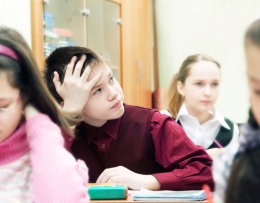01 February 2013
 Results from one of the largest surveys of school teachers undertaken in South Australia have revealed that it is high levels of student disengagement that are the real problem in schools.
Results from one of the largest surveys of school teachers undertaken in South Australia have revealed that it is high levels of student disengagement that are the real problem in schools.
The University of South Australia led Behaviour at School Study (BASS) surveyed almost 1400 South Australian teachers to assess how they viewed student behaviour and what actions they were taking to modify poor behaviours in the classroom.
The results show that the key challenge for teachers in classrooms today is to find ways to encourage active and engaged learning.
Lead researcher Dr Anna Sullivan says while extreme disruptive and violent incidents in the classroom get a lot of air time, results from the survey show these are relatively uncommon.
“More than 60 per cent of the teachers surveyed, reported that the unproductive student behaviours encountered were at most, pretty innocuous,” Dr Sullivan says.
“It seems our real issue is students simply tuning out. This almost passive resistance to learning in class and doing homework was the most reported behaviour of concern with 43 per cent of teachers reporting students ‘avoiding doing schoolwork’ as a key problem.”
The data show that teachers found talking out of turn (50%); avoiding doing schoolwork (43%) and disengaging from classroom activities (41%) were among the most common problems with students.
“The study has clearly supported the theory that it is the more passive negative behaviours that we need to be looking at, not only because they are more prevalent, but also because they are harder to fix by ‘step’ systems of behaviour management,” she says.
The research found that many teachers were using the step system and other forms of reasoning with students to try to manage low level behaviour issues but that on the whole they found disengaged behaviours more difficult to manage.
“We found across the board that teachers employed a limited repertoire of practices to respond to disengaged behaviours in the classroom,” she says.
“Teachers were more likely to attribute disengaged behaviours to their students’ limitations – their lack of self-discipline, negative attitudes and lack of perseverance, or to non-school factors such as lack of parental guidance and management, or dysfunctional family structures - than to anything about the school environment.”
Dr Sullivan says the study was based on the view that the learning environment is an ecosystem in which many factors interact to shape student behaviour.
“From this perspective, students’ behaviours can be seen to be influenced by a complex mix of factors, and not simply by the students’ personal characteristics,” she said.
“The study offers an important challenge to teachers to reassess how they explain the causes of student disengagement.
“Understanding the school as an ecological system, opens up real opportunities for teachers to identify the elements in the system that they can strongly influence – namely, the curriculum they teach, the teaching approaches they use, and how they interact with students.”
Dr Sullivan says the study identified particular groups of teachers who may need additional support to manage student behaviour.
“We found that the teachers most challenged by disengaged or low-level disruptive student behaviour were generally in the under-29 age bracket and at the beginning of their careers,” she said.
“This supports the research we have done on the experiences of early career teachers in that it confirms that these teachers need extra support to help them in the first few years of their careers.”
A copy of the full report, Punish them or engage them? Teachers’ views on student behaviours in the classroom is available online at www.bass.edu.au
This Australia Research Council supported research project has been conducted in collaboration with Flinders University, Catholic Education South Australia, the Association of Independent Schools and the Department of Education and Child Development and four major SA Principals Associations.
Media contact: Michèle Nardelli office: 08 8302 0966 mobile: 0418 823 673
email: michele.nardelli@unisa.edu.au




